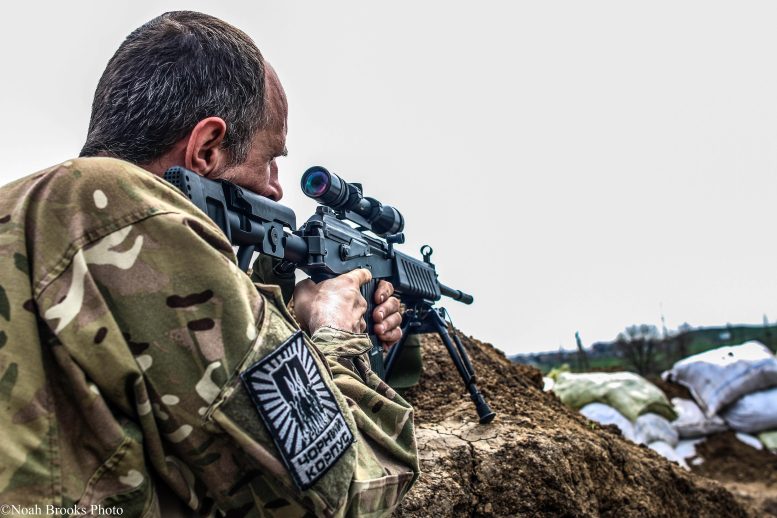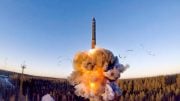
A Ukrainian soldier near the front lines in the Donbas region in 2015. Credit: Noah Brooks / Ministry of Defense of Ukraine
An international law expert outlines terms for a possible agreement on Ukraine, including proposals for the Donbas and Crimea regions, and a “Cooperative European Security Architecture.”
A “finely balanced formula” in which the disputed Donbas regions have increased self-governance but remain Ukrainian, and a tacit “status quo” for Crimea is agreed along with rights for minority groups, could help provide an “off-ramp” for both sides in Russia’s war on Ukraine.
“It is vital the Ukrainian government is not pressured into accepting outcomes that reward a war of aggression.” — Marc Weller
This is according to a proposed settlement designed by Marc Weller, Professor of International Law at the University of Cambridge and leading legal expert, who has mediated in a wide range of conflicts for the United Nations and others, including Kosovo, Syria, Yemen, and Russian-occupied Transnistria.
Weller’s suggested deal would see NATO maintain its “open door” policy but grant Russia medium-term assurances on an effective moratorium for Ukraine, and possibly Moldova and Georgia, while allowing Sweden and Finland access if wished.
While nuclear arms controlled by the United States remain in Europe, the peace plan compels a return to negotiations on limitations of intermediate-range nuclear weapons on both sides, as part of several “confidence-building” steps.
Importantly, Weller argues that no agreement should intrude on pursuing Russian accountability for the horrific war crimes witnessed by the world in recent weeks, which may ultimately see demands for trillions of dollars in reparations to Ukraine.
His proposal is published by international law forum Opinio Juris in the form of a draft outline agreement.
“A settlement will only be possible when victory is unlikely, or when losses imposed upon either side by a continuation of conflict become truly unbearable,” said Weller. “That moment may come sooner or later, but in any event, we be must be ready to help establish peace.”
“The sense of outrage and injustice on the part of Ukraine will be difficult to overcome. It is vital the Ukrainian government is not pressured into accepting outcomes that reward a war of aggression.”
Moscow demands recognition of the independence of Donetsk and Luhansk, the “states” in eastern Ukraine’s Donbas region recognized by Russia at the outset of the conflict.
Their supposed independence was cynically used by Russia to argue a right of self-defense of these purportedly sovereign states, says Weller. He argues that these are “non-states,” and backing for purported statehood is not possible under international law.
Weller advocates a revised version of 2015’s Minsk II agreement that Russia has long complained was never fully implemented – one offering plenty of autonomy to both districts yet keeping them within Ukraine’s sovereign territory.
His proposed compromise, a form of “asymmetrical federation,” would see overall claims of statehood abandoned, but areas – or Oblasts – within the Donbas that have ethnic or linguistic majorities be given greatly enhanced local self-governance.
“Unless Donetsk and Luhansk walk back their unfeasible claims to statehood, they will remain trapped in the twilight of international isolation, even with Russia propping them up,” said Weller.
“A settlement that keeps them as Ukrainian provinces but in an environment of self-government – almost virtual statehood – will allow both Oblasts authority over all their territory, rather than just the third taken by force in 2014,” he said.
“This would be balanced by internationally guaranteed rights to genuine local elections and safeguards for the right of minority populations – whether Russian speaking or Ukrainian.”
International observers should be maintained throughout to reassure populations of all backgrounds, says Weller, as should the possibility of cross-border links to the Russian Federation to placate separatist groups.
While cease-fire and retreat of forces – along with full humanitarian access – are conditions that underpin the settlement, Russian withdrawal from the Donbas regions could be subject to a “transitional phase.” “However, Ukraine must not suffer de-facto division forever more as a consequence of turning the invasion into a frozen conflict,” Weller said.
Crimea cannot be formally recognized as part of Russia, Weller contends, regardless of Kremlin demands. However, both sides could pledge not to challenge the “territorial status quo” of the situation as of February 23, 2022, forcibly or perhaps in general terms, for the sake of hostility cessation.
This balancing act would require international cooperation to secure rights for Crimea’s non-Russian speakers, and see the region’s Tatars – a mainly Muslim population persecuted during the Soviet years – benefit from a restoration of the ethnic minority “special protection” they once had.
While NATO’s “open door” policy will remain unshakeable in principle, Washington has already floated possible moratoria on Ukraine membership. Any settlement could adapt this into a self-imposed limitation by Ukraine for a given period of time – expressed through a legally binding unilateral declaration. Weller argues that such commitments could extend to Georgia and Moldova if needed.
He also outlines “Cooperative European Security Architecture” strategies to help reassure eastern European states that will not join NATO in the medium-term.
This would draw on existing arrangements as well as establish further steps to build transparency and keep regional tensions in check: rules for military flights toward national borders; prior notice agreements for military maneuvers; arms limitations in key areas, supported by third-party verification.
Read more about the proposed settlement from Marc Weller in the Scotsman.









He’s holding a weapon>
Where did the weapon come from>
What were the raw materials that comprise the weapon>
These are questions by Digital Superintelligence>
Time Traveler Took This Picture In The Year 6000>
3,665 views Aug 20, 2018<
See what this looks like writing it backwards:
[for the right of minority populations – whether Russian speaking]
Speaking Russian Whether Populations of Minority have Rights
(A rather inhospitable arrangement if you take into account what others have thought about the hypocrisy . . . practice of claiming to have moral standards or beliefs to which one's own behavior does not conform; pretense).
We might need a room frull of these guys to negotiate a real settlement…
Kissinger’s plan for Ukraine revised
Lyubomir Ivanov *
As the Ukraine War is progressing we see an increased interest in analyzing its outcome and follow up. The scenarios considered range from calling for a no-fly zone (Philip Breedlove), to some sort of compromise (Henry Kissinger), to a willful surrender of the West (David Pyne).
Needless to say, one of the fundamental issues to be resolved is the territorial sovereignty of Crimea, Donetsk and Luhansk. Any peace agreement ceding these territories to Russia should provide for a full and complete compensation, and the present article deals with this often overlooked necessity.
Discussing confrontation and wars in his opinion piece “To settle the Ukraine crisis, start at the end” published in The Washington Post edition of 5 March 2014, former US Secretary of State Henry Kissinger aptly advised that the test of policy is how it ends, not how it begins. He proposed a set of four principles for settling the Ukraine crisis, warning that if some solution along those or comparable lines was not achieved, then the drift toward confrontation would accelerate, and the time for that would come soon enough. As it turned out, no such settlement was reached and now, eight years later, we got a full-fledged war waged by Russia against Ukraine instead.
It seems high time to start at the end all over again, revisiting and possibly revising Kissinger’s original plan. For that purpose, we recall also the comparable principles suggested in our article “Falkland Islands and Crimea the new cold war” of 7 May 2014 discussing the Crimean conflict and its parallel with the Falklands. We focus primarily on the territorial sovereignty and foreign and security policy aspects, leaving aside other key post-war issues like the necessity for a Marshall Plan for Ukraine and its funding scheme proposed by Ukrainian ex-premier Oleksiy Honcharuk and Russian economist Vladislav Inozemtsev.
Kissinger’s first principle was, respecting Ukraine’s choice to become part of the European Union rather than some Eurasian integration project. Apparently, this choice is deemed uncontroversial by Russia – although the EU may well come to develop increasingly robust security and defence capabilities of its own and in close cooperation with NATO.
The next two principles of Kissinger’s were Finlandization and NATO non-membership of Ukraine. The problem is, these could hardly be imposed indefinitely upon a sovereign state. As pointed out by Norwegian diplomat Helge Vindenes (his letter “Sovereignty also means freedom to change policy” published in the Financial Times edition of 4 February 2022), nothing is more central for a country’s sovereignty than the ability to change its foreign and security policies when circumstances in its view require that to be done. In other words, to ensure it would not join NATO, Ukraine should readily agree to give up sovereignty and become a sort of Russian protectorate. Therefore, for a sovereign Ukrainian state the relevant principle is: NATO membership if Kyiv so wishes, implementing the NATO Heads of State and Government decision of 3 April 2008 that Ukraine and Georgia will become members of NATO. The Allies should promptly invite both Ukraine and Georgia to sign the North Atlantic Treaty.
Kissinger’s last principle stipulated that Russia would recognize Ukraine’s sovereignty over Crimea as it was incompatible with the rules of the existing world order for Russia to annex Crimea. True enough, yet hardly the point that might drive possible negotiations forward. On the other hand, why should Ukraine be prepared to relinquish her internationally recognized rights over Crimea for nothing? The same goes for the self-declared People’s Republics of Donetsk and Luhansk. A stumbling block if there ever was one, this territorial sovereignty imbroglio warrants some further elaboration.
Keeping Crimea, Donetsk and Luhansk Ukrainian would certainly be the best choice. Failing that, second best would be the territory swap suggested in our quoted article, for it is only a territory gain that could compensate for a territory loss. Say, Crimea and the two breakaway republics might be recognized as Russian with certain uninhabited or sparsely populated Russian territories (like the polar archipelago of Novaya Zemlya) ceded in return to Ukraine. The value of the swapped entities could be balanced by a delimitation of Crimea’s share in the Black Sea exclusive economic zone disproportionately favouring Ukraine. Once negotiated, the overall package would be put on nationwide referendums in both Russia and Ukraine.
The present settlement proposal is probably nonstandard, possibly win-win, and definitely not a compromise one. Its implementation would be in compliance with international law, facilitating a return to normalcy and reinvigoration of the world order as we knew it.
* Lyubomir Ivanov is a Bulgarian scientist and NGO activist who has served as MP and parliamentary secretary of the Bulgarian MFA, co-authored the Bulgarian Constitution, and sponsored both the 1990 parliamentary decision for his country to join EU and the 1991 parliamentary decision for Bulgaria to participate in the Allied liberation of Kuwait. Founding chair of the Antarctic Place-names Commission of Bulgaria and national representative to SCAR Standing Committee on Antarctic Geographic Information. Publications on foreign and security policy, self-determination, fertility and immigration policy; also in linguistics, introducing in particular the modern universally accepted system for the Romanization of Bulgarian Cyrillic alphabet.
Manfred Wörner Foundation
Sofia, March 2022
Licensed under the CC BY-SA 4.0 International license
https://www.researchgate.net/publication/359502021_Kissinger's_plan_for_Ukraine_revised
The soldier in the photo is currently defending Azovstal steel plant in Mariupol.
you men really like to f##k up the world and for what ?